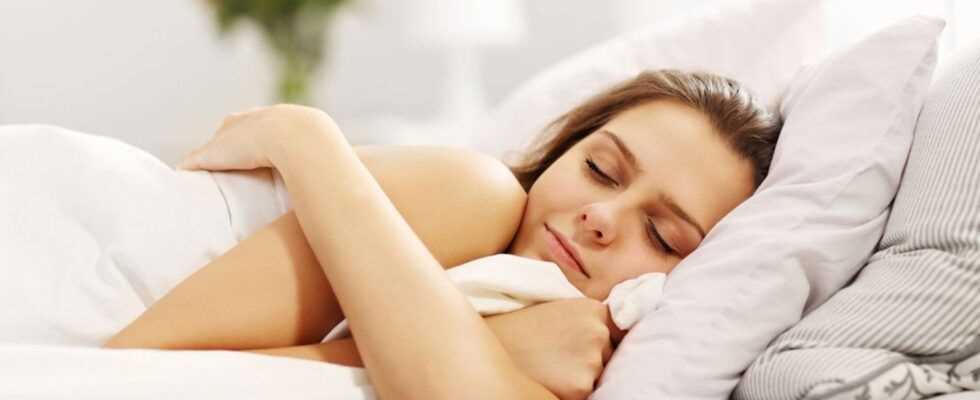Sleep naked
Is that healthy?
© Kamil Macniak / Shutterstock
Should I sleep naked? Or does that harm me? You can find out whether there are health advantages or disadvantages here.
Sleeping naked: what's in it for me?
For many people, especially on hot nights, it often sounds like the only way to be able to fall asleep: sleep naked. But is that actually healthy – or can it even harm us? In fact, the answer is probably somewhere in between.
Does sleeping naked lead to better sleep on hot nights?
In principle, it is not directly harmful to sleep naked and leave your pajamas out of bed. If you cannot rest due to the high temperature in the room in summer, you can do without clothes. The advantages of this are:
- You can cope better with heat – and your body has to cool down by about one degree anyway before you can fall asleep.
- Without pajamas or a nightgown, some people feel less cramped. However, clothes for sleeping should be cut a little wider anyway and made from a skin-friendly and soft fabric such as cotton.
- If you lie skin to skin with your partner in bed, you promote the production of the binding hormone oxytocin. Stress is reduced, we calm down more easily and feel happier. All of these help you fall asleep better too.
- Sleeping naked can be healthy and hygienic: This means that you sweat less, especially in the genital area, which removes the breeding ground for pathogenic bacteria and fungi.
Sleeping naked: cons
But before you rip off your pajamas or nightgown and go to sleep naked, you should the possible downsides view of it:
- Cooling off in sleep: Once we have fallen asleep, sleeping naked can also become a problem. Because in REM sleep, the reflexes for regulating body temperature fail. This means that we overheat or undercool more easily, but do not react to this, for example by pulling the blanket up or kicking it away. Among other things, this can result in a cold.
- Frequent change of bed linen: Even if we are generally not too hot, we lose a lot of fluids in the form of sweat during sleep. Usually this is caught by clothing. We sleep naked, but he runs into the bedding. For hygienic reasons, it should then be changed and washed twice a week – which is not only time-consuming, but also harms the environment.
Danger: Anyone who sleeps naked should avoid an additional cooling source such as a fan that is aimed directly at the body. Because the cold draft is more likely to cool us down, without noticing it.
Does sleeping naked make you slim?
It is often said that sleeping naked is easier to lose weight. The alleged reason for this: the body has to produce more heat. However, experts assume that there is only a minimal effect here – if at all. Because with a deep and restful sleep, the metabolism is reduced anyway. The fact that you can weigh up to 1.5 kilos less in the morning after getting up than in the evening is primarily due to the fact that we lose a lot of fluids at night.
What else helps in the heat?
Whether you skip your nightgown or pajamas or not – there are other good tips to help you fall asleep more easily on hot nights. These include:
- Cold pillow: The best way to do this is to simply fill a hot water bottle (with a fabric cover if possible) with a little cold water and then use it as a pillow. If the head and neck are cooled slightly, sleeping in the heat is much easier.
- Darken the room: If it is hot during the day, if possible only ventilate once in the morning and in the evening and otherwise keep the windows in the bedroom closed and the curtains drawn to keep the room dark.
- Take a lukewarm shower: Shortly before going to bed, it is worth taking a lukewarm shower on hot nights. Make sure that the temperature is actually lukewarm – because cold water is pleasant at first, but it ensures that the blood vessels constrict and heat can no longer be transported away so well.
Reading tips: You can find out everything about tiredness after eating here. We also explain everything about proper sleep hygiene and the snooze button.
Do you want to find out more about health topics? Then take a look at our BRIGITTE Community.

